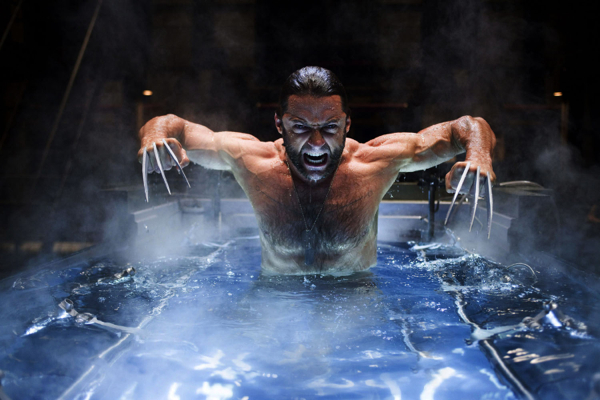Movie review by Greg Carlson
On the pulpy pages of the Marvel comic books that have seen Wolverine evolve into one of the most popular characters in the medium, a thorough accounting of the irascible Canadian’s origins did not materialize until the person also known as Logan had been around for decades. Wolverine first showed up in “The Incredible Hulk” in 1974, and not too many months later he was a member of the X-Men, a relationship that developed into a lucrative partnership that reached beyond comics into TV cartoons, videogames, toys, collectible cards, tee shirts, posters, and other merchandise. In 2000, Wolverine transitioned to the big screen in Bryan Singer’s successful “X-Men” feature film, and Hugh Jackman’s interpretation pleased zealous, protective comic book fans and earned a legion of new admirers.
The latest installment of the big screen mutant saga is called “X-Men Origins: Wolverine,” and director Gavin Hood’s cold, businesslike style lacks everything that made Singer’s first two “X-Men” movies interesting even to non-fans. From commentary on discrimination to human rights and the notions of estrangement and otherness, Singer’s movies at least took stock of some of the themes that emerged from the comic series. None of that kind of material stands a chance in “Wolverine,” which thunders from action scene to action scene at the expense of any focus on the psyche of its title hero.
It is a given that film adaptations of superhero comics reconfigure all kinds of well established lore that has already morphed and transformed in countless retellings on the page, but “Wolverine” makes a hash of Logan’s childhood, never pausing to offer several explanations that would seem salient to a movie with the word origins in the title. Fundamentally, Wolverine is more compelling, more haunted, more tragic, and more exciting when shrouded almost completely in mystery. For many fans of a certain age, Wolverine’s “cool” factor went hand in hand with the idea that we knew little of his past. Hood’s movie does to Wolverine approximately what the “Star Wars” prequels did to Boba Fett.
Jackman captures many of the details that define Wolverine, from the submerged psychic scars to the cigar-chomping swagger. He continues to play Logan effectively, even though poor writing leaves the actor to skate by on the goodwill he developed in the three previous X-Men outings. Other personages from the comics are even less intriguing: Ryan Reynolds’ mouthy Deadpool and Taylor Kitsch’s cocky Gambit are employed foolishly and fleetingly. The development of Logan’s relationship with Kayla Silverfox (Lynn Collins) should be of central importance, given the not so surprising revelations in the last section of the movie.
Hood’s decision to avoid any intelligent risk-taking results in a lukewarm action movie brimming with all kinds of genre clichés. You get to see individuals walk calmly away from massive explosions and emerge from water in slow motion. There are also way too many overhead shots of characters clenching their fists, tilting their heads skyward and yelling “Noooooooo!” The movie’s final insult shows us how Wolverine lost his memory, a laughable reminder that this lame prequel has now caught us up to the point where, movie-wise, we met the protagonist. When Wolverine later turns his full attention to recovering his past and filling in the forgotten details of his life, couldn’t he have just asked any number of folks who were with him in “X-Men Origins: Wolverine”?
